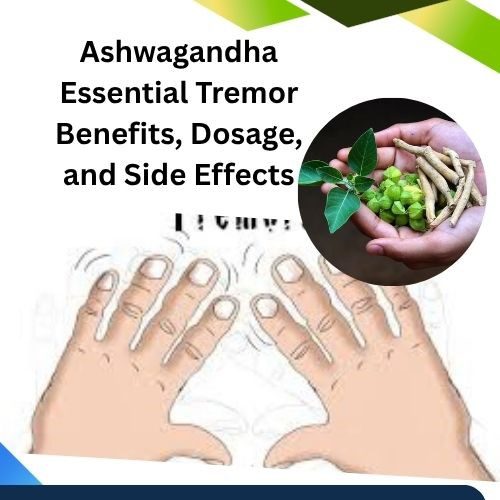Essential tremor is one of the most common movement disorders, affecting millions of people worldwide. It often starts subtly—with mild shaking of the hands—but can progress to more noticeable tremors in the arms, head, or voice, making daily tasks like writing, eating, or drinking difficult. While there is no definitive cure, natural remedies such as Ashwagandha are gaining attention for their potential to support nerve health and reduce tremor severity. Alongside other herbal remedies for essential tremors like apple cider vinegar for essential tremors, many people are exploring alternative treatments for better symptom management.
In this article, we will explore the ashwagandha essential tremor connection in depth—how it works, its potential benefits, recommended dosage, and possible side effects—so you can make an informed decision about incorporating this ancient herb into your wellness plan.
What Is Essential Tremor?
Essential tremor (ET) is a neurological condition characterized by involuntary, rhythmic shaking. Unlike Parkinson’s disease, which is also associated with tremors, essential tremor typically occurs during movement rather than rest.
It often affects the hands but can also impact the arms, head, voice, or legs. The condition is usually progressive, meaning symptoms may worsen over time. Although the exact cause isn’t fully understood, research suggests a combination of genetic factors and abnormalities in brain function, particularly within the cerebellum—the part of the brain that controls movement and coordination.
Common symptoms include:
- Shaking hands or fingers, especially when writing or holding objects
- Trembling voice
- Head nodding (yes-yes or no-no motion)
- Difficulty with fine motor tasks (e.g., buttoning clothes)
- Increased tremors with stress, fatigue, or caffeine
While medications like propranolol and primidone are commonly prescribed, they may come with side effects and are not always effective for everyone. As a result, many individuals seek natural alternatives like Ashwagandha and other herbal supplement for essential tremor options to manage their symptoms safely and holistically.
Understanding Ashwagandha: The Ancient Adaptogen
Ashwagandha (Withania somnifera), also known as Indian ginseng or winter cherry, is a powerful herb used for centuries in Ayurvedic medicine. It is classified as an adaptogen—a natural substance that helps the body resist physical and emotional stress.
The active compounds in Ashwagandha, called withanolides, possess potent anti-inflammatory, antioxidant, and neuroprotective properties. These effects make it a promising natural supplement for neurological and movement disorders, including essential tremor.
Key Properties of Ashwagandha:
- Neuroprotective: Protects nerve cells from oxidative stress and inflammation
- Anxiolytic: Reduces stress and anxiety, which can trigger or worsen tremors
- Muscle relaxant: Helps calm muscle contractions and improve coordination
- Antioxidant: Neutralizes free radicals that can damage brain cells
- Adaptogenic: Balances cortisol levels and supports the body’s resilience
These mechanisms suggest that Ashwagandha may play a role in managing essential tremor symptoms by promoting nervous system balance and reducing stress-related tremor intensity. This reflects a growing movement to discover the herbal solutions people swear by when managing chronic neurological conditions naturally.
How Ashwagandha May Help with Essential Tremor
The ashwagandha essential tremor connection is based on its impact on several key biological pathways related to nerve health and stress response. Let’s explore the main ways Ashwagandha may benefit people living with essential tremor:
Reduces Stress and Anxiety
Stress and anxiety are known to exacerbate tremor symptoms. When you’re stressed, your body releases more adrenaline and cortisol, stimulating the nervous system and worsening involuntary shaking.
Ashwagandha is one of the most well-studied natural adaptogens for reducing cortisol levels and calming the nervous system. Several clinical trials have demonstrated that it can significantly lower stress scores and improve mental well-being.
By promoting relaxation and emotional stability, Ashwagandha helps minimize tremor triggers related to anxiety and psychological tension.
Supports Nervous System Health
Essential tremor is believed to involve abnormal brain activity, particularly in the cerebellum and thalamus. Ashwagandha’s neuroprotective compounds, including withanolides and sitoindosides, help protect nerve cells from oxidative stress and inflammation.
Animal studies have shown that Ashwagandha can regenerate axons and dendrites, enhance synaptic function, and improve communication between nerve cells. These effects may help restore balance in the nervous system and reduce involuntary shaking.
Improves Motor Coordination
Some research indicates that Ashwagandha can enhance motor coordination and physical performance by modulating neurotransmitters like GABA (gamma-aminobutyric acid).
GABA is the brain’s primary inhibitory neurotransmitter—it helps calm overactive nerve signals that can lead to tremors. Ashwagandha appears to stimulate GABAergic activity, which can soothe overexcited neurons and reduce tremor frequency and severity.
This calming effect on motor neurons makes Ashwagandha potentially beneficial for those dealing with essential tremor. Interestingly, what research is being done on benign essential tremor? continues to explore similar mechanisms that Ashwagandha seems to influence naturally.
Enhances Sleep Quality
Poor sleep can make tremors worse by increasing fatigue and nervous system sensitivity. Ashwagandha has been shown to promote better sleep by improving relaxation and reducing cortisol levels.
A 2020 randomized controlled trial found that adults taking Ashwagandha extract for six weeks experienced improved sleep quality and reduced sleep latency compared to placebo. Better rest can lead to more stable nerve activity and fewer tremor episodes.
Reduces Oxidative Stress
Oxidative stress is a major factor in neurodegenerative and movement disorders. Excessive free radicals damage brain cells and disrupt communication between neurons.
Ashwagandha’s antioxidant properties help neutralize free radicals and boost antioxidant enzyme levels (like superoxide dismutase and glutathione). This protective effect may prevent further damage to nerve tissues involved in essential tremor.
Scientific Research on Ashwagandha and Tremors
While direct human studies on Ashwagandha for essential tremor are limited, several related studies support its neuroprotective and anti-anxiety benefits, which are directly relevant to tremor management.
Neuroprotective Benefits
A 2019 study published in the Journal of Ethnopharmacology found that Ashwagandha extract significantly improved neuronal regeneration and memory function in animal models of neurodegeneration. The researchers concluded that Ashwagandha could enhance brain function and protect against neurological disorders.
GABAergic and Anticonvulsant Effects
A 2015 study demonstrated that Ashwagandha’s compounds increased GABA receptor activity, leading to reduced seizures and muscle spasms in rats. Since essential tremor involves hyperactive nerve firing, this mechanism is highly relevant.
Stress and Anxiety Reduction
Multiple human clinical trials have shown that Ashwagandha reduces cortisol levels by up to 30% and alleviates anxiety symptoms. In one study published in the Indian Journal of Psychological Medicine, participants taking 300 mg twice daily reported significant reductions in anxiety and stress compared to placebo.
These findings support Ashwagandha’s role in calming the nervous system, a key component of tremor management. Similarly, a tremor patient says ultrasound treatment ‘transformed’ her life, showing how both natural and medical approaches can bring meaningful relief.
Recommended Dosage of Ashwagandha for Essential Tremor
There is no universal dosage for Ashwagandha, but general recommendations are based on clinical studies and traditional Ayurvedic practice. The effective dose depends on the form of Ashwagandha used—root powder, extract, or capsule.
Typical Dosages:
- Ashwagandha root powder: 1–2 teaspoons (3–6 grams) daily, mixed with warm milk or water
- Ashwagandha extract (standardized to 5% withanolides): 300–600 mg daily, divided into two doses
- Capsules/Tablets: 300–500 mg twice daily, depending on the product
Tips for Use:
- Take with meals to avoid stomach discomfort
- Combine with warm milk or ghee (traditional Ayurvedic practice) for better absorption
- Start with a lower dose and gradually increase to assess tolerance
- Consistency is key—benefits may take several weeks to become noticeable
Always consult your healthcare provider before starting any new supplement, especially if you are taking prescription medications for tremors or other conditions.
Possible Side Effects of Ashwagandha
Ashwagandha is generally considered safe for most people when taken in recommended doses. However, as with any supplement, it may cause side effects in some individuals.
Common Mild Side Effects:
- Stomach upset or diarrhea
- Drowsiness or mild sedation
- Headache
- Nausea
Serious or Rare Side Effects:
- Allergic reactions (rash, itching, or swelling)
- Lowered blood pressure (caution for people on antihypertensive drugs)
- Interactions with thyroid medication (it may increase thyroid hormone levels)
Who Should Avoid Ashwagandha:
- Pregnant or breastfeeding women (may cause uterine contractions)
- People with hyperthyroidism
- Individuals on sedatives or anti-anxiety medications
- Those scheduled for surgery (due to potential sedation effects)
Always consult your doctor before use, especially if you have an underlying medical condition or are taking medication for essential tremor.
How to Choose the Right Ashwagandha Supplement
Not all Ashwagandha supplements are created equal. To get the most benefit and ensure safety, follow these guidelines when choosing a product:
- Look for Standardized Extracts
Choose products standardized to contain 5% withanolides, the active compounds responsible for Ashwagandha’s effects. - Opt for KSM-66 or Sensoril Extracts
These are two of the most researched, high-quality Ashwagandha extracts known for consistent potency and safety. - Check for Third-Party Testing
Select supplements tested by independent labs for purity, potency, and absence of heavy metals or contaminants. - Prefer Organic and Non-GMO Options
Organic Ashwagandha is free from harmful pesticides, ensuring a cleaner and safer product. - Read Labels Carefully
Avoid products with unnecessary fillers or artificial additives.
Combining Ashwagandha with Other Natural Remedies
While Ashwagandha can be beneficial on its own, it may work even better when combined with other herbal remedies for essential tremors. Many people find this approach complements their wellness journey and supports overall nervous system health.
Lifestyle Tips to Support Essential Tremor Management
In addition to Ashwagandha, adopting certain lifestyle changes can help minimize tremor frequency and severity:
- Reduce caffeine and alcohol intake, as these can worsen tremors
- Practice relaxation techniques such as meditation, deep breathing, or yoga
- Exercise regularly to improve coordination and muscle control
- Get adequate sleep, as fatigue can increase tremor activity
- Eat a balanced diet rich in antioxidants and anti-inflammatory foods
Combining these habits with Ashwagandha supplementation may offer the best natural support for managing essential tremor symptoms.
Final Thoughts: Can Ashwagandha Help Essential Tremor?
While more research is needed specifically on ashwagandha essential tremor, existing evidence suggests that this powerful adaptogen may help reduce tremor intensity by supporting nervous system health, lowering stress, and improving sleep and coordination.
Its combination of neuroprotective, anxiolytic, and antioxidant properties makes it a promising natural option for individuals seeking alternative or complementary relief. However, Ashwagandha is not a cure for essential tremor. It should be used as part of a broader wellness plan that includes medical guidance, proper nutrition, and stress management.




